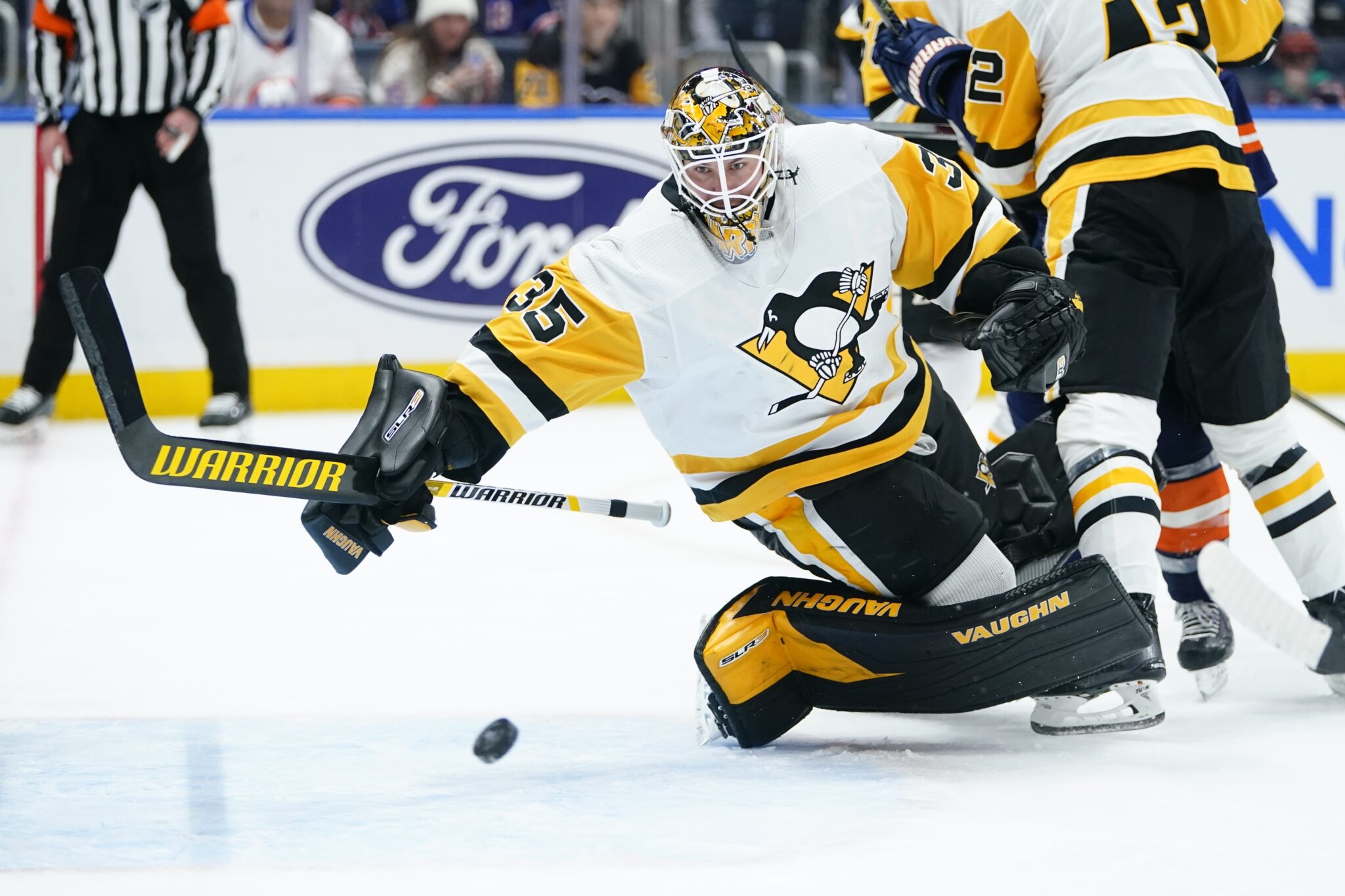Penguins
Revisiting Jarry Contract, Should Penguins Walk Away? What NHL Playoffs Show

There has been a shift in the hockey world, or at least a willingness to consider a shift in thinking and strategy regarding goaltending, and the Pittsburgh Penguins’ goaltending situation and contract discussions for Tristan Jarry could be ground zero for proving or disproving the new theorem.
Do teams really need an expensive, bonafide, A+, No. 1 starting goalie?
On one side, the Florida Panthers are in the Stanley Cup Final because their expensive franchise netminder finally showed up after a season of inconsistency. Without Bobrovsky, Florida was toast in Round One.
Conversely, the Carolina Hurricanes and Vegas Golden Knights were in the conference finals without a true starting goalie. The Toronto Maple Leafs, Edmonton Oilers, and New Jersey Devils were in the second round without a franchise goalie.
Teams with a legit franchise guy in the pipes, the Tampa Bay Lightning, New York Rangers, New York Islanders, are Winnipeg Jets, didn’t survive the first round. And how do we classify the soon-to-be Vezina Trophy-winning Linus Ullmark in Boston, who didn’t escape Round One?
I first heard the “new thinking” several weeks ago. And then another league source mentioned it.
Teams, perhaps led by analytics, perhaps led by their eyes, are openly considering goalie tandems or a pair of 1A-type goalies.
What does that mean for the Penguins and Tristan Jarry?
Many “traditional” thinkers (including me) have opined regarding the need for the Penguins to have a top-shelf starting goalie, and since Jarry is the only one on the market, the Penguins must pay up (within reason).
However, the Stanley Cup playoffs are teaching us something different. It should give GMs pause.
Revisiting the Tristan Jarry situation, if a new Penguins GM isn’t comfortable with his health history and performance level, walk away, or set a lower value commensurate with the risk, leaving more money to fortify the position.
And the more the situation marinates, I’ll talk a mulligan on advocating the Penguins pay Tristan Jarry at least $36 million over six years.
Nope, it doesn’t have to be done. The risk and reward factor no longer seems skewed toward fear of losing, but fear of enduring injuries and inconsistency, but being locked into another albatross contract.
Of course, there is a flip side. If Toronto had a legit starting goalie, could they have flipped the Round Two series? If Edmonton had a solid netminder, could they have beaten Vegas in Round Two?
If the Buffalo Sabres had a quality NHL netminder in the pipes, would they have made the playoffs?
The Dallas Stars are struggling in the Western Conference Final because they rode Jake Oettinger into the ground. They have a good goalie but rode him like a tireless franchise goalie into the ground by giving him more than 60 appearances this season. He looks gassed.
The contrary is important because it sets the bookends.
The answer becomes even clearer when defining the extreme or ends of the spectrum. The answer is in the middle. A franchise goalie is a wonderful commodity, but an average No. 1 goalie need not be overpaid. Nor can a team win with soft goaltending.
A franchise type OR a pair of solid goalies seem to be the way to go.
With a tandem, there is a risk that neither goalie gets traction. That seemed to be the case in Toronto, where Matt Murray and Ilya Samsonov traded more struggles than hot streaks. And Edmonton, where Jack Campbell’s performance fell off the table, and they were forced to ride Stuart Skinner.
New Thinking / Pittsburgh Penguins?
The new philosophy takes some getting used to. For example, Penguins coach Mike Sullivan perhaps could have used Casey DeSmith more often in the second half as injuries dogged Tristan Jarry. The longstanding thinking is that if your starting goalie is available, he starts. There’s no fault to Sullivan for putting the better goalie in the net.
But remove the “starting goalie” label, and the situation becomes something different.
The Penguins needed just one more win, right?
To this point in his career, Tristan Jarry has flashed top-shelf potential, but will he become a franchise goalie? The new GM will have to decide. If the answer is no or probably not, avoid a big-time contract or simply walk away.
Overpaying a starting goalie who isn’t elite surely isn’t the way.
The Pittsburgh Penguins will have other options to build a reliable goaltending situation. Other teams are showing the way.













